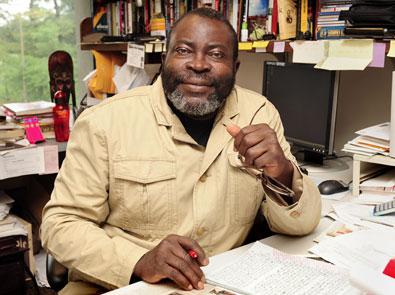Inside Iowa State
Inside ArchivesSubmit newsSend news for Inside to inside@iastate.edu, or call (515) 294-7065. See publication dates, deadlines. About InsideInside Iowa State, a newspaper for faculty and staff, is published by the Office of University Relations. |
June 12, 2008 
Photo by Bob Elbert. The strength of an African perspectiveby Steve Jones, LAS Public Relations The first 11 years of Tunde Adeleke's life were spent in a Nigerian city. His childhood, however, was marked not by urban life but a provincial upbringing in a "compound" of 10 to 15 families. "I grew up in a city, but my development was pretty much defined by that compound of people with backgrounds of common ancestry," said the director of Iowa State's newly named African and African American Studies program. "In that clannish world, I actually attained my social consciousness." Adeleke ("ADD-uh-le-key"), also a professor of history, brings his African perspective to the African and African American Studies position. He is able to illustrate issues drawn from his background that help U.S. students better understand African American history. "There is so much of their [black Americans'] history tied to Africa that you can only understand if you also understand African history," Adeleke said. He added that students appreciate learning from that context. "You can't get it in a textbook." New name reflects expanding programAfrican and African American Studies is a cross-disciplinary program in the College of Liberal Arts and Sciences. Students explore the history and experiences of blacks in America, Africans and people of African descent throughout the world. In May, the program name was changed from African American Studies to reflect an expanding curriculum that includes stronger links to Africa. "In the late '60s," Adeleke said, "the focus was on the black American experience -- what happened to blacks in America. Forty years later, the program has grown and we can enrich the field by broadening it. The black experience didn't start in America, it started in Africa." The name change will not detract from the program's traditional emphasis on black America, said Adeleke. "It's a win-win situation, really, because the change will help us to better understand the black American experience." English roadblockAdeleke's journey to Iowa State began in 1978 when he finished his undergraduate degree in Nigeria, and he was interested in graduate study in African history. At the time, Africa was seeing an upswing of nationalism regarding the experiences of blacks in the diaspora. The African diaspora was the forced dispersion of peoples to other parts of the world, most notably the slave trade to the Americas. He was told if he wanted to study African history, he ought to also examine the diaspora to understand the complete story. That led Adeleke to the University of Western Ontario, London, in Canada by "default." Adeleke knew the United States was the place to study the diaspora, but he met an "unreasonable roadblock." He was required to take a test of English as a foreign language. It offended him as a matter of principle. English is the national language of Nigeria, he argued. "I had the qualifications, and I believed it was unreasonable," he recalled. Canada, because it -- like Nigeria -- is a British Commonwealth nation, waived the language test. Adeleke began studying with a professor whose expertise was slavery, and he later received funds for summer research in the United States. After earning his doctoral degree, Adeleke taught for five years in Nigeria before returning to the United States for history and African American Studies faculty positions at Ohio State and Loyola of New Orleans. In 2000, he was named director of African American Studies at the University of Montana, Missoula. Entering his third year at Iowa State, Adeleke sees additional growth in his program, which is adding two new faculty members. Similar programs at other U.S. universities also are expanding. "There is a strong interest in the African American experience and in broadening it and linking it with the broader global black experience," Adeleke said. |
Quote"Forty years later, the program has grown and we can enrich the field by broadening it. The black experience didn't start in America, it started in Africa." Tunde Adeleke |